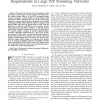Free Online Productivity Tools
i2Speak
i2Symbol
i2OCR
iTex2Img
iWeb2Print
iWeb2Shot
i2Type
iPdf2Split
iPdf2Merge
i2Bopomofo
i2Arabic
i2Style
i2Image
i2PDF
iLatex2Rtf
Sci2ools
JSAC
2011
2011
The Asymptotic Behavior of Minimum Buffer Size Requirements in Large P2P Streaming Networks
—The growth of real-time content streaming over the Internet has resulted in the use of peer-to-peer (P2P) approaches for scalable content delivery. In such P2P streaming systems, each peer maintains a playout buffer of content chunks which it attempts to fill by contacting other peers in the network. The objective is to ensure that the chunk to be played out is available with high probability while keeping the buffer size small. A small playout buffer means that the playout delay is small. Thus, the objective is to study the tradeoff between two measures of QoS, chunk playout rate and delay. A policy is a rule that suggests which chunks should be requested by the peer from other peers. We consider consider a number of recently suggested policies consistent with buffer minimization for a given target of skipfree playout. We first study a rarest-first policy that attempts to obtain chunks farthest from playout, and a greedy policy that attempts to obtain chunks nearest to playout. ...
Free Probability | Greedy Policy | JSAC 2011 | Target |
| Added | 16 Sep 2011 |
| Updated | 16 Sep 2011 |
| Type | Journal |
| Year | 2011 |
| Where | JSAC |
| Authors | Srinivas Shakkottai, R. Srikant, Lei Ying |
Comments (0)

